#epimetheus hades 2
Explore tagged Tumblr posts
Text
Epimetheus headcanons:
Carefree and forgetful, but sweet and well-intentioned. Before everything, that is.
Animal lover. Likes animals more than people, and not just because he made them all and sees them as his babies. That said, he has very conflicted feelings about Aetos.
Inferiority-complex. His brother is Prometheus.
Guilt-ridden and depressed. His brother is Prometheus.
Hot. HIS BROTHER IS PROMETHEUS.
Has an emotional support animal.
There is so much RAGE inside him, mostly towards himself, but when it's directed at someone hoooo...
Primary role is providing Prometheus and all of Chronos's allies with stuff. He collects the stuff himself and with the help of his animal friends. He keeps everything in the empty box Pandora opened...as a reminder.
Counts his stock obsessively. Never runs out. Can never run out...
On par with Prometheus in terms of strength, having fought side by side against the Titans. Underestimates himself terribly.
Does not have premonitions like his brother, but he does have severe nightmares of past events. Sleep-deprived as a result.
Fights like a wild animal, the kind that rips your face off if you get too close.
Does not blame Pandora, only himself.
Blames the gods, but not enough.
Spends his free time counting stock and ruminating on the past.
Barely speaks to his brother out of shame, but listens to his every word and obeys his every order.
Pandora's box was his breaking point. But hope still remains in him.
65 notes
·
View notes
Note
Gee Epimetheus, how did you get so lucky that the gods gave you a wife? Are your brothers jealous?




Epimetheus:"Maybe I was lucky! But they don't seem to envy me, they just don't get it."

#q&a time#*this is all a flashback so...°3°*#Side note: our girlie Dora is dead#random trauma dump!#let's go#silly goofy guy goes brrrrr#epimetheus#pandora#greek mythology#hades 2#hades game#hades supergiant#hades#greek titans#mini comic
160 notes
·
View notes
Text
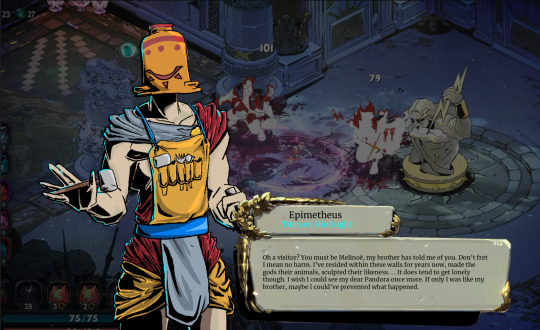
The back of his pot has an open eye on it representing how he can only see backwards not forwards.
The pot is from some versions of the pandora myth where instead of a box it’s a pot.
#artists on tumblr#traditional illustration#illustration#digital illustration#funny art#fan art#original art#traditional art#my art#digital art#artwork#art#memes#meme#funny memes#tumblr memes#lol memes#relatable memes#greek gods#ancient greek mythology#greek mythology#hades 2 fanart#hades fandom#hades supergiant#hades game#hades 2#hades ii#hades fanart#hades#epimetheus
50 notes
·
View notes
Text
Jesus this is dark.
Maybe he considers it "atonement" for "failing" humanity as their creator/protector. He considers having his own liver torn out a drop in the ocean compared to the misery inflicted on his children.
Maybe being helpless for so long and being helpless to prevent so much misery (even though the gods CHOSE to cause it), he no longer considers himself enough. In his mind, he is no longer sufficient to protect his children from harm. Therefore any help, even from his tormentor, is acceptable, even necessary.
If this is how the "beloved" titan feels about himself, you can only imagine how his "loser" brother feels.

Coping with the fact that I have to go to work by thinking about Prometheus. WHYYYYYY are you still letting this bird eat you
Like dude you are plenty dangerous on your own you don't need this fuck ass bird!
It's giving absolutely lethal levels of psychological damage tbh. His ENTIRE WORLD has been this bird eating him for years, he doesn't know what his existence is like outside of being eaten by this bird anymore. Sure he hates it, but it's also been all he knows.
Do you think he cuts it out himself now? Maybe takes poppy first, uses a sharp blade (a cleaner cut than an eagle's beak), tells himself it's okay as long as he's the one doing it?
171 notes
·
View notes
Text
If we do end up meeting Epimetheus in Hades 2 then I kinda hope his power is just as much a burden as Prometheus’, to the point where it’s genuinely debilitating (cause it’s interesting).
Like… if his hindsight were to work as an ability to revisit the past in a more concrete and nuanced way than what he experienced in the moment, just how much unwanted information about background stuff he wasn’t even aware of at the time (or even implied by the memory itself) would come flooding into his mind? Just how many times would he catch deception in other peoples words or actions only once they’re firmly in his memories? (And isn’t that just his entire myth?)
An example would be someone complimenting you and you feeling good about yourself afterword, only for any attempt to recall the compliment be completely ruined when an instinctual, intuitive sense tells you that they didn’t really mean what they said at all (despite there not necessarily being any real evidence in the memory itself). Even worse, they were just saying that because they wanted something from you. It’s like social anxiety but with real proof in the form of divine domain.
Basically I’m saying I think it’d be cool if his hindsight operated as him becoming a third-person omniscient narrator but only when he recalls the past, never the present or the future. Sure his powers might provide some clarity, but for the most part it would have come too little too late, with only regret for what you didn’t know at the time. Of course he could just not use these abilities (if it’s even voluntary), but then he might just end up paranoid and confused with all the things he knows he doesn’t know. Then again even if he were using his abilities all the time he would still probably be overwhelmed by all the possibilities for the “true nature” of his present moment.
Either way, him being “scatter-brained” as Prometheus put it makes a lot of sense. Hindsight is 20/20, but ignorance is bliss. His powers don’t HAVE to work this way, I just think it’d be an interesting parallel to his brother if we do see him in-game. Idk, just some ideas.
51 notes
·
View notes
Text
Okay, so for my own fanfictions, most of which take place post-TOA and therefore post-Percy "claim your children" Jackson and Jason "honor minor gods" Grace, I made myself a spreadsheet of all the cabins I believe could plausibly be at Camp Half-Blood, and ended up with a whopping 270, and there's probably more dieties whom I couldn't find any information on, and some dieties whom I don't believe would have a cabin (ex. Kronos) (if you think I should add someone comment) and decided to paste it here, since I don't feel comfortable sharing my original spreadsheet. I did add the water dieties, even though their kids could also plausibly go to the underwater camp, but I've decided to give them the option of what camp they want. I also didn't copy their domains, but I have the list from my research, so you can ask if you'd like, I'll be glad to explain! Most of my research was from Theoi Project - Greek Mythology, and Brittanica, and probably some others I've since forgotten, so if you know any good Greek Mythology resourses and books, please share!
Here's some symbols before we begin:
* - virgin goddess. I added them because Athena and Artemis already have cabins (and Athena kids by magical means)
" - Dieties whom have faded in the series. Their cabins are more memorials to them.
Additionally there are 2 dieties named Thalia, (1) Thalia refers to the muse, the goddess of comedies, and (2) Thalia refers to the goddess of festivities and banquet
Zeus
Hera
Poseidon
Demeter
Ares
Athena*
Apollo
Artemis*
Hephestus
Aphrodite
Hermes
Dionysus
Hades
Iris
Hypnos
Nemesis
Nike
Hebe
Tyche
Hecate
Rhea
Hestia*
Calliope
Clio
Urania
(1) Thalia
Melpomene
Polyhymnia
Erato
Euterpe
Terpsichore
Musica
Persephone
Despoina
Morpheus
Epiales
Thanatos
Aristaeus
Asclepius
Epione
Hygeia
Panaceia
Aegle
Iaso
Aceso
Telesphorus
Eris
Phobos
Deimos
Peitharchia
Alastor
Alce
Hybris
Ioke
Lyssa
Palioxis
Phrice
Phyge
Polemus
Proioxis
Alala
Homodos
Cydoimus
Democracia
Dicaiosyne
Dike
Nomus
Eunomia
Pradaxide
Arete
Homonoia
Adicia
Horcus
Neicea
Poena
Bia
Kratos
Zelos
Phthonus
Agon
Anaideia
Ate
Cacia
Coalemus
Corus
Dolus
Dysnomia
Dyssebia
Oizys
Prophasis
Ptocheia
Thrasus
Soteria
Soter
Paregoros
Sophrosyne
Porus
Ponus
Plutus
Euthenia
Aedos
Aeschyne
Aletheia
Anance
Angelia
Caerus
Calocagathia
Eirene
Ececheiria
Elpis
Epiphron
Eucleia
Eudaemonia
Gelus
Eupheme
Euphrosyne
Eupraxia
Eusebia
Euthymia
Eutychia
Ctesius
Hesychia
Sophia
Techne
Eleus
Penia
Pistis
Phthisis
Pheme
Ossa
Penthus
Ania
Morus
Momus
Apate
Limus
Achos
Aergia
Adephagia
Amechania
Aporia
Geres
Eros
Aglaea
Anteros
Calleis
Charis
Harmonia
Hedone
Himerous
Philia
Philopharosyne
Philotes
Pothussexual
Hedylogus
Peitho
Amphitrite
Triton
Kymopoleia
Rhode
Benthesikyme
Aegaeus
Argyra
Calliste
Capheira
Keto
Kharybdis
Delphin
Proteus
Eidothea
Electra
Thaumas
Eurybia
Glaucus
Helle
Leucothea
Palaemon
Phorcys
Thallasa
Thoosa
Triteia
Tritonis
Tethys
Nereus
Doris
Thetis
Psamathe
Galateia
Eudora
Aeolus
Boreas
Zephryos
Notos
Euros
Khione
Oreithyia
Hesperus
EosphorusVenus
Phainon
Phaethon
Pyroeis
Stilbon
Aether
Arce
Astraeus
Asteria
Eos
Hemera
Nyx
Herse
Helios"
Selene"
Pan"
Aix"
Ganymede
Britomartis*
Oupis*
Loxo*
Hekaerge*
Ariadne
Comus
Thysa
Thyone(formally Semele)
Telete
(2) Thalia
Pompe
Epidotes
Pherespondos
Lykos
Pronomos
Pyrrhichus
Priapus
Phales
Oxylus
Nesi
Methe
Melisseus
Kortymbos
Autonoe
Eileithyia
Carmanor
Carme
Chrysothemus
Daeira
Eleusis
Macaria
Melinoe
Charon
Lethe
Acheron
Gorgyra
Cocyrys
Pyriphlegethon
Styx
Leto
Anchiale
Anytus
Dione
Epimetheus
Eurynome
Aura
Lelantos
Mnemosyne
Melete
Aiode
Perses
Phoebe
Prometheus
Theia
Themes
So that's my list. I don't really have a rhyme or reason for why each number is each, but I did clump together gods with similar domains because that's where they were easiest to find in my research... I honestly think kids of minor gods are very underused in TOA fics, and even in PJO and HOO to an extent. Jillie, my nine year old daughter of Gelus with a contageous laugh? One of my fave OCs.
As for Roman gods and goddess, I'm not as knowledgable, but hopefully I'll make a spreadsheet for plausable godly parents, though unlike CHB it doesn't need to be organized as there's just Cohorts. I don't write Camp Jupiter fics all that often, but it'll be a good resource to have if I choose to.
#camp half blood#minor gods#greek mythology#percy jackson and the olympians#heroes of olympus#trials of apollo#camp half blood cabins#percy said claim your kids jason said honor minor gods and goddesses and I went overboard with research
58 notes
·
View notes
Text
Hades 2
Lately, I've been a bit obsessed about Hades 2, I've been watching people play the test run , listening to compilations of interactions and scouring theories.
While doing all of that, I noticed something of a pattern, a theme that often came back and I think I may have found out one of the MAIN theme and conflict of the game and I've seen nobody talk about it yet, so here we go.
More under if you're not against being possibly spoiled.
I think one of the major themes of Hades 2 is going to be about Humanity and its complex relationship with the Gods, the way the gods treat mortals and the way mortals treat the gods.
here are my evidences
The interactions
the first thing that put me on this path was this interaction between Melinoe and Nemesis.
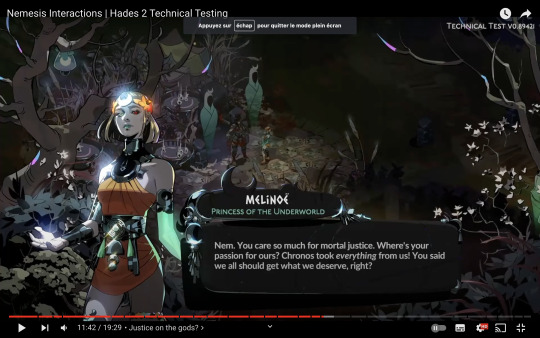

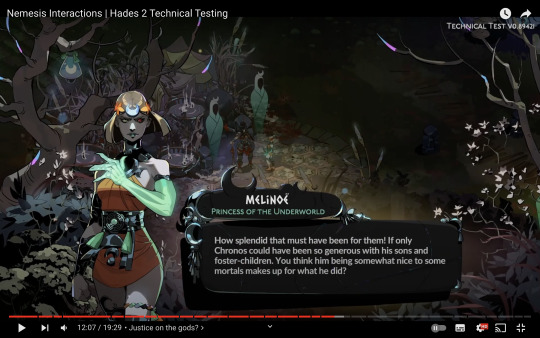
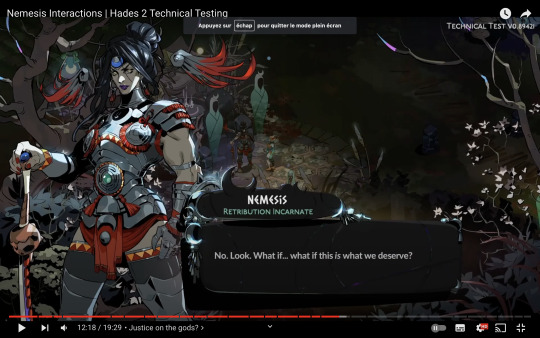
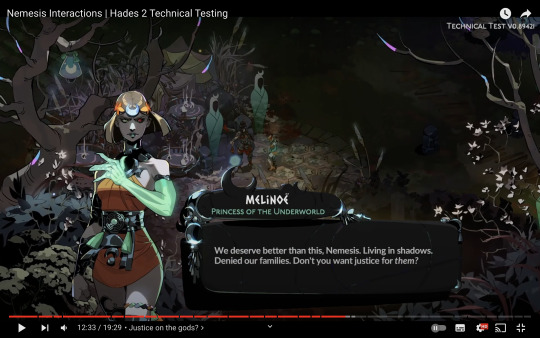
In this conversation, Nemesis and Melinoe are talking about Retribution and Justice and how Nemesis believes that Kronos taking over the underworld and challenging the Olympians may be what they deserve. Notice how Nemesis specifically mentions mortals and the Golden Age.
For those who don't know, in greek mythology the Golden Age was the first Era of Humanity and when Chronos was the ruler of the heavens. It was a time of peace and harmony for humanity where there existed no plague or famine, there was no need to work as they could simply pick their food from nature itself. They lived long lives, remaining youthful and died peacefully in their sleep.
Nemesis is I think trying to hint to Melinoe that maybe the situation is not exactly as black and white as it first seems and that humanity may have a bigger role in this than first thought.
A second interaction i want to bring to mind is about Moros and his relationship with mortals.
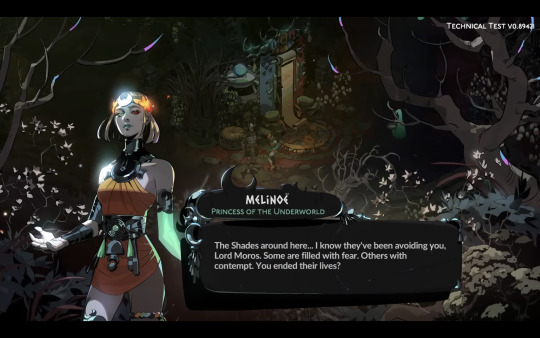
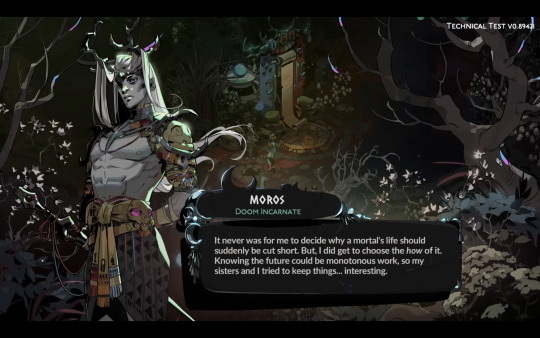
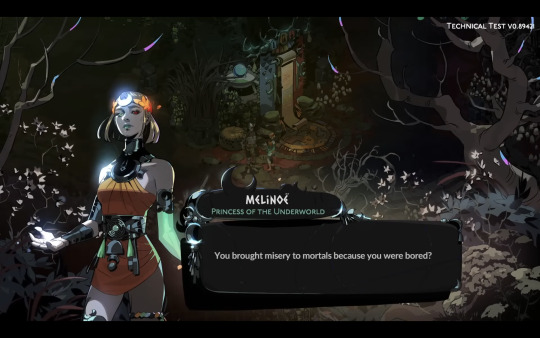
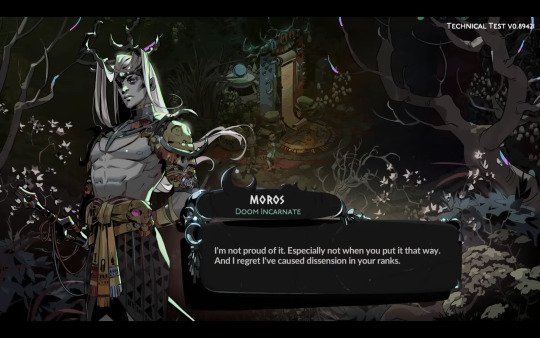
Here Moros admits that sometimes he because of was simply bored he would knowingly bring doom and pain to Mortals ending their lives painfully.
Archnea's interactions are also the strongest contenders for that theory, as they bring back that theme of divine cruelty, the gods view of mankind and how they callously treat them.
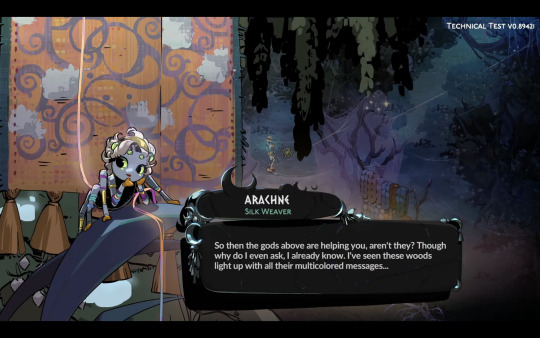
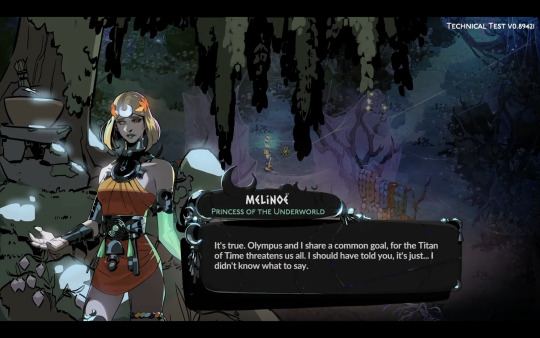
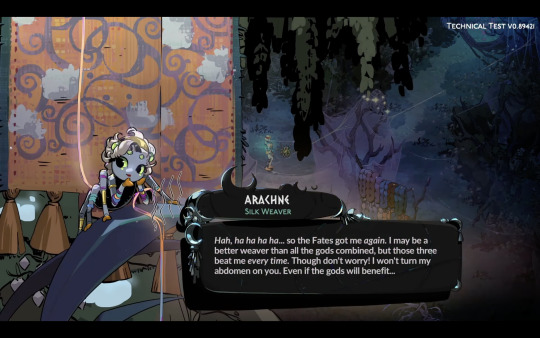
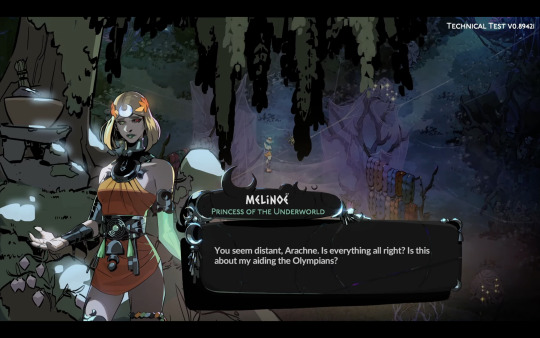
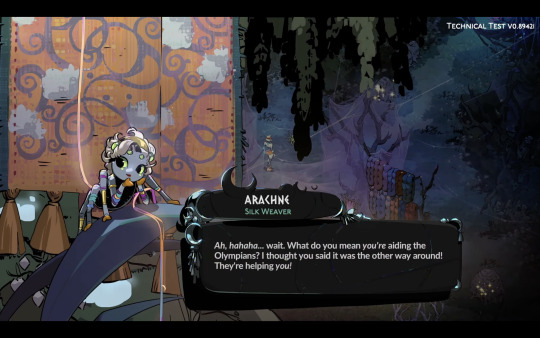
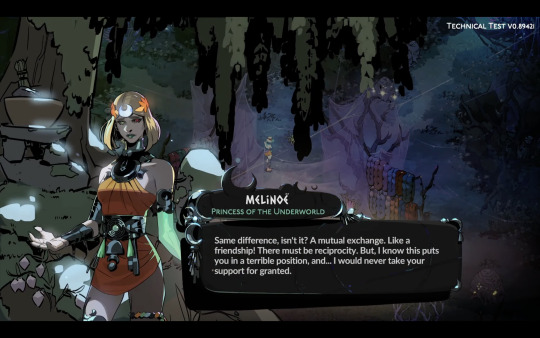
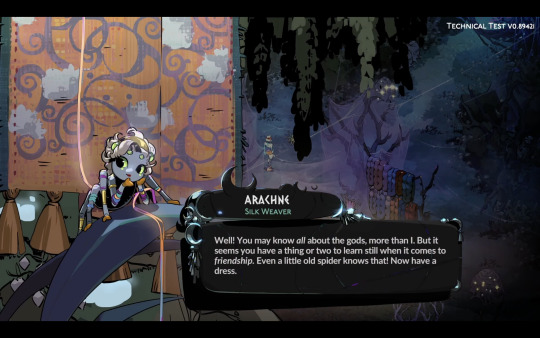
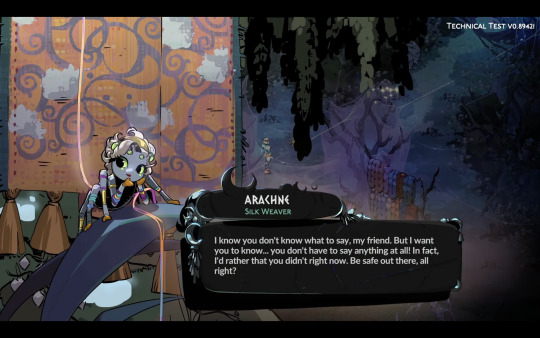
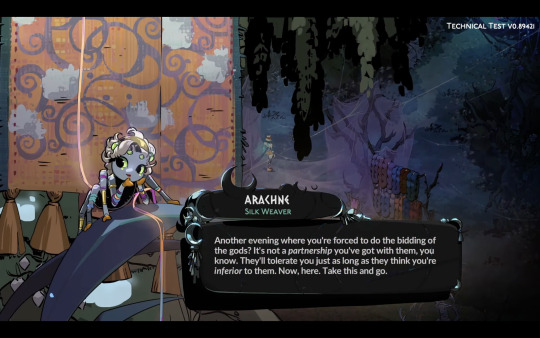
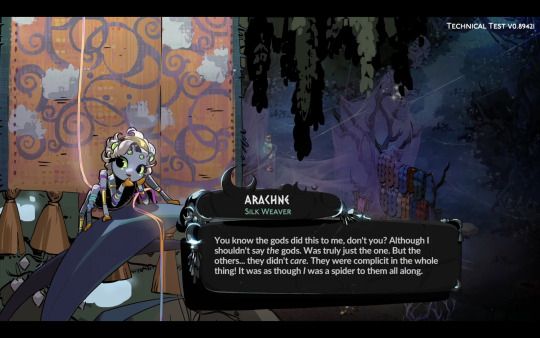
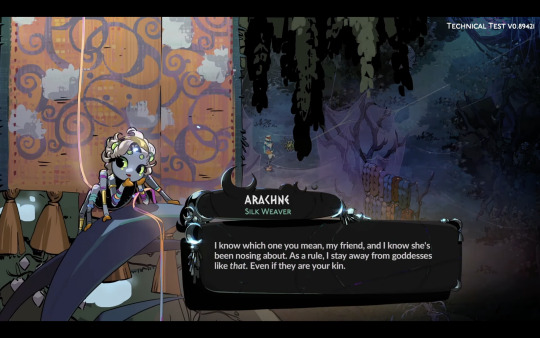
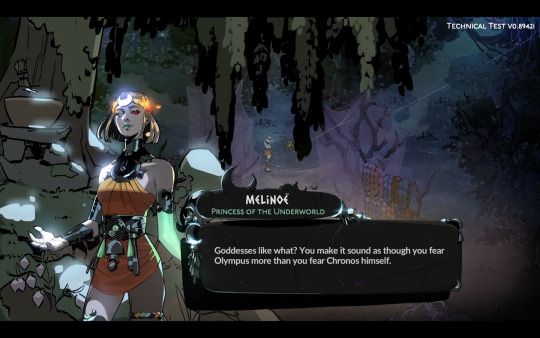
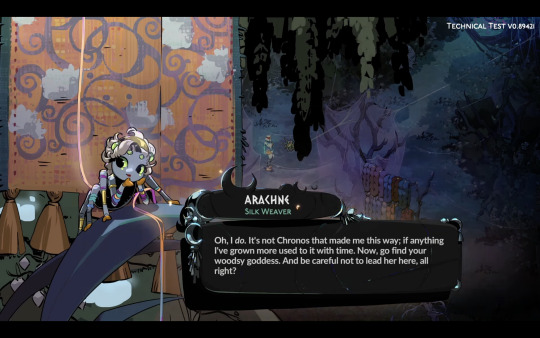
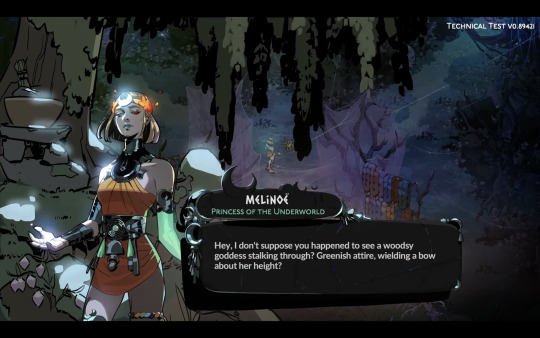

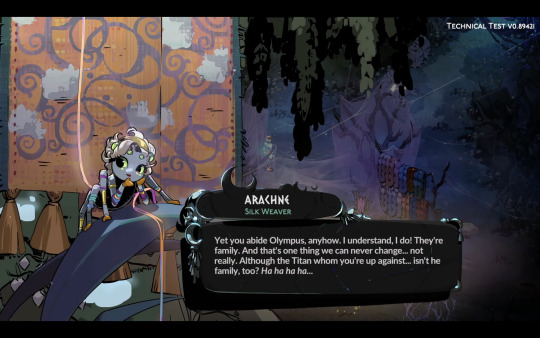
She has been wronged by the gods for the simple reason that she was better than them at something and they naturally couldn't stand it so they cursed her to live as a spider. She is filled with resentment for them and even warns Mel not to trust them. Also, note how she admits she fears the gods more than she fears Chronos.
2. Dora
Now Dora is a bit particular because we don't know much about her, but I have seen a theory and some interaction with Moros seem to be pointing toward it, which is that she might be Pandora, the original sinner of Greek mythology.
the myth of Pandora goes a bit like this: During the Golden Age, after Prometheus stole fire from the gods and gifted it to humanity, the gods decided to punish Prometheus by punishing humanity. They built Pandora, a woman beautiful beyond compare, and gave her a box full of the evils of the world. They then send her to seduce Epimetheus Prometheus's brother, who despite his brother's warning is promptly seduced by Pandora's beauty and welcomes her into his home. She then opened the box and released the evil of the world upon mankind, thus ending the Golden Age. Only hope stays inside the box.
Again if this is indeed true, it would follow the theme of the gods inflicting pain and suffering upon mankind for petty reasons, uncaring about the consequences of those actions.
3. Hades I
During the first game, many interactions points toward the gods general uncaring attitudes about mortals. Demeter thinks it was a mortal who stole her daughter away, so she decides that she will punish them all by starving them with an eternal winter. The other gods make almost mention of it only to say how much it annoys them.
4. Speculation
This part is not so much about evidences and more about speculations about the story of Hades 2 based upon my theory that mankind is going to be central in this tale.
The reason how Chronos is so powerfull, powerfull enough to free himself from Tartarus and claim the Underworld for himself, is that mortal were tired of being the gods' playthings and prayed to him, they prayed for his return, for the return of the golden age, where pain and suffering were unknown to them and the gods weren't using them for their own amusement.
The gods are going to have to deal with the fact that their poor treatment of humanity has consequences and those consequences are the return of Chronos and a second titonomachy.
Melinoe will propably have to face the fact that Chronos is wrong in challenging the gods and that the current status quo cannot be sustained any longer. The Olympian gods will have to change how they treat mankind if they wish to even have a stand a chance against chronos.
(TLDR, The Olympian gods have treated mankind like shit for a long time and now they are dealing with the consequences of those actions when the mortals are praying to Chronos to come back and restore back the golden Age where their lives weren't even half as awful. Melinoe will have to deal with the fact that her family might very well deserve what is happening to them and if she wishes to save them, the gods will have to change.)
#I taught of all of this under the shower#might do more if I find new interactions that support this theory#but im actually pretty proud of this one already#I think it would be thematically intersting if a story about gods ends being in the end about mankind and its struggles#Apollo bless me with your dodgeball#hades 2#hades ii#Hades 2 theory#hades supergiant
87 notes
·
View notes
Text
Thank you for the tag!!
(in no particular order!)
1. Dimitri Alexandre Blaiddyd (Fire Emblem Three Houses)
2. Fuuta Kajiyama (Milgram)
3. Vil Schoenheit (Twisted Wonderland)
4. Shu Itsuki (Ensemble Stars)
5. N (Pokemon) I don't feel like putting his whole name
6. Epimetheus (Dragalia Lost)
7. Kanade Yoisaki (Project Sekai)
8. Sara Chidouin (Your Turn To Die)
9. Akiko Yosano (Bungou Stray Dogs)
10. Hypnos (Hades)
No pressure tags!: @clueless-shapeshifter @silentstaresfanficandfanart @cosmical-flowers and anyone else who wants to join!
TAG GAME— List 10 of your favorite characters from different fandoms
Thank you for tagging me @coderiderr
Hortensia (Fire Emblem Engage)
Juvia Lockser (Fairy Tail)
Kaze (Fire Emblem Fates)
Lisia (Pokémon)
Maka Albarn (Soul Eater)
Owain (Fire Emblem Awakening)
Shirayuki (Snow White with the Red Hair)
Van Hohenheim (Fullmetal Alchemist)
Yuuri Katsuki (Yuri!!! on ICE)
Zeref Dragneel (Fairy Tail)
Tagging: @fayesdiary @dragonballwish @elegyofthemoon @sevarix-blogs @ghostlydragonpainter
#fire emblem#milgram#twisted wonderland#enstars#pokemon#dragalia lost#project sekai#your turn to die#bungou stray dogs#hades
1K notes
·
View notes
Text
Fic Masterlist
Lie to Me (Apollo x Percy)
Summary: Percy's got a lot going on: a new apartment, a new job, a new editor for her manuscript, a new ... boyfriend? Can't forget the new army Hazel's been cooking up in New Rome. Oh, and her Dad wants her to get married, preferably to someone immortal, because he just loves her that much.
Apollo ... isn't really into marriage, or that much into Percy, or at all into doing Poseidon's bidding. But he is into revenge. And safety. And maybe into overthrowing Zeus. He's just grateful he's a good liar.
How else is he meant to pretend he loves Percy for the rest of his life?
Playlist
Part 1, Part 2, Part 3, Part 4, Part 5
The Last of a Dying Breed (Apollo x Percy)
Summary: “You do not go on quests, Percy,” Apollo told her flatly. “You assign them. You're the one they come to when they need to embark on a perilous journey.”
“I send them to their deaths, you mean,” Percy snapped.
“If that's what lies in their fate,” was the callous answer.
Percy Jackson grows up during World War II, takes up the mantle of the Oracle of Delphi in a desperate bid to save her fellow demigods – and then watches all her siblings die one by one due to a prophecy she made.
Bianca di Angelo just wants to know why she cannot remember anything except the face of the Oracle sleeping in the attic of the Big House. And why Annabeth insists that Bianca is the hero they need to find Zeus’s stolen lightning bolt.
Preferably before they start World War III.
Playlist
Part 1, Part 2, Part 3, Part 4
Memory in a Mural (Apollo x Percy)
Posted on AO3
Summary: Percy never thought he'd say this, but he felt a smidgeon of sympathy for a Titan. If hindsight was 20-20, then there was no way that Epimetheus, with his shoddy vision, ever walked anywhere without crashing into innumerable walls.
For Percy, after all, the clues had been as obvious as a trail of breadcrumbs.
But it still took Daedalus showing Percy, not Icarus, the marvellous mechanical wings the inventor had devised to escape the Labyrinth, for the demigod to notice the arrow speeding straight for his face.
Being stuck here, not in a dream, but in someone else's body, was the wall that Percy had crashed into and brought down on himself.
Percy had landed in the past – and he had no one but himself to blame.
Part 1, Part 2
Concealed in the Coriolis (Apollo x Percy)
Posted on AO3
Blurb: “I just want to have a baby with you,” Coronis screamed at the sky. “Is that so much to ask for?”
Apollon winced audibly behind her. Bedding a beautiful woman was never a hardship. It was just ...
“We need to have Asclepius,” Coronis said, eyes bright with the fervour of a zealot. “A temple to him in every town, where anyone who needs healing can receive it. A system of medicine that will last for millennia. The skill to heal even death!”
And then she pointed a hand up at the blazing Sun overhead. “And a caesarean! You need to cut Asclepius out in the first such surgery.” “After I’m dead,” she amended after a moment before brightening. “Though I’ll live again in the wonderful world he’ll build, so that’s fine.”
Yes, Apollon would have bedded Princess Coronis in a heartbeat. If only she hadn’t opened her mouth!
Or, Percy Jackson never expected to end up in the body of a princess from ancient Greece. Especially not this princess. But as a child born in a hospital from a caesarean, he knows his duty. Lie on his back and think of his mom. No, not that way.
If only Apollo would get with the plan!
Part 2, Part 3, Part 6, Part 7, Part 14, Part 17
Dionysus Presents: The Gods of Olympus
Summary: Where Apollo picks on Dionysus because how come someone other than him is the one allowed to live full-time at his new Delphi? And Dionysus decides to ruin Apollo's life by making a tell-all, ridiculous show about the Gods.
Starring: Apollo the Instrument Shop owner, Zeus the Pilot, Hades the Crystal Connoisseur, Poseidon as That One Surfer Dude Who Thinks He Can Fish, Ariadne the Apple of the Director's Eye (or should it be grape?), and other sundry gods Dionysus is sure will get on his wrong side someday.
Part 1, Part 2, Part 3
The Sand on your Shores (Apollo x Percy)
Read on Ao3
Summary: “Percy Jackson?" Apollon queried haughtily.
The sole human of the trio looked over insouciantly. “Yeah?”
Apollon pursed his lips, inordinately irritated at being ignored by the other two. No creature with the scales of the sea or with the glow of divinity should ever ignore him, even if he was currently mortal.
“You have been granted the great privilege of my services,” Apollon gritted out.
“Which one?” the monstrous son of Poseidon inquired.
Apollon glared in silent inquiry.
“Which Percy Jackson are you meant to serve?” the monster clarified.
Apollon blinked, abruptly shaken out of his terrified fury. “There's more than one?”
“You see,” the demigod explained with the air of one who knew he was about to ruin a person's day, “We're all Percy Jackson. Every single one of us.”
Part 1, Part 2, Part 3
Drowning on Dry Land (Apollo x Percy)
Read on AO3
Summary: For a fleeting second, Apollo imagined that he was in one of his gilded marble temples. This was just another petitioner come crawling on their knees for a miracle from the great Apollo. Then the second passed. The walls were the impersonal, antiseptic white of the Apollo Teaching Hospital, not the carved marble of a Roman temple. At his side wasn’t a stone altar but a creaky metal examination table on the verge of collapse. And he wasn’t the Olympian god Apollo but the grandson of Koios, the Titan Lord of the North, eking out his survival by virtue of his mother’s tears and his grandfathers’ forbearance. “Ms Percy Jackson.” Apollo addressed the eighteen-year-old. “As often as you visit, I’m starting to think you just want to see me.” Kronos won the war before the Olympians even knew there was one. Stripped of most of his domains and stuck performing menial tasks for the Titans' entertainment, Apollo is desperate for any change. And then he finds a demigod he just knows will be important.
40, 43, 48, 49, 50
Fluttering Fireflies (Apollo x Percy)
Posted on Ao3
Summary: Percy stared at Apollo, flummoxed. “I told you that accepting anything from you because you have a crush on me would be taking advantage of you. So you decided you wanted to marry me instead?”
“Yes,” Apollo stated.
Percy ran a hand through his hair, before he turned a beseeching look at his father. But Poseidon just offered him a proud smile.
And why not? The god had just arranged the marriage of his youngest child with an Olympian who had fallen for Percy like a rock off the peak of Mount Everest.
Percy threw up his hands in the air. “I … am done. Just done.” Done wondering just when he’d entered an alternate dimension where Poseidon took pleasure in betrothing Percy.
1, 2, 3
Between the Heavens and the Embers
Posted on Ao3
Summary: Percy was an eagle. Without wings or claws, Percy had somehow become an eagle. "Focus." “I,” she began haltingly. “I was …” trying to avoid sleep, “trying to detect any pursuers. When my hearing sharpened. And I could suddenly overhear … birds.” The rustle of feathers, the flutter of leaves, the whistle of the wind through the slats, and the screeching of the train wheels on the rails. The metronome beating a steady, artificial rhythm where Apollo’s heart should have been. “I can hear things,” she finished pathetically. “In moments of terrible stress,” Apollo glanced around their banal surroundings and amended, “or moments of great paranoia, demigods are liable to direct their untapped potential into cultivating their senses for a power-up. You’re transitioning – from human to something more … demigodly. You’re literally growing more sensory receptors. But your brain–” Apollo shrugged as if the state of her pitifully mortal brain matter was a foregone conclusion. “Brains are delicate. Elastic, but given to self-preservation. It’ll be a long time if ever until you adapt to your senses.”
Long enough that she might die because of those senses.
Part 1
Ocean of Storms (Apollo x Percy)
Apollo is many things - the premier mage of light on Earth, the director of the Association of Medicine, the son of the ruler of most of the known Universe. He's also, more recently
The killer of his great Uncle, one of the titans of the Titans Corporation.
Exiled from Earth
Stuck on Pan, a watery exoplanet in the Andromeda Galaxy
Falling in love with a smuggler, provider of home-made health supplements, and quite possibly someone who sparks storms across the planet when she's upset
About to get into a fight with the Titans so he can get his exile rescinded and return to Earth.
It's been a busy couple of weeks.
Part 1, 2
My world's gone upside down
A Cornucopia of Surprises (Apollo x Percy)
Summary: A god for a boyfriend brings along a lot of perks: fast transportation, a warm body to leech heat off, and the certainty that this was one guy who was never going to die on her. Sure, Apollo had his issues - chief among them an incomprehensible distaste for Taylor Swift.
But that was no reason to turn Percy into a horror from the deep seas just because she sang a few too many lyrics! (And no, mermaids weren't cute. They couldn't breathe above water, after all.)
Part 1, Part 2
Stuck in your Head (Apollo x Percy, Percy x Annabeth)
Posted on AO3
Summary: Chaos tries to send Persia Jackson into the past because she'd like a few more followers, thank you. The Fates drag her into Perseus's Jackson's world to regurgitate her life story because they'd rather not get wiped from existence, thank you. And Percy? Well, Percy doesn't think reading about the life and times of his alternate is going to prove very useful when the gods have never learnt of a loss they can't change.
Rachel ... thinks the boy in her dreams is creepy. Just not creepier than the guy promising to return her to her home if she only does him a teeny-tiny favour and helps him kill Daedalus before Kronos can possess an automaton.
The gods have also never heard of patience or waiting until they have the whole story, after all.
Part 1
House of Memories
Posted on AO3
Tyche really might be into him, Apollo realised as he looked at the arm-length splinter buried into the ground just a couple inches from his foot.
Then he dismissed the notion.
More like, Eris had the hots for him, really, but he was just too good to fall for her machinations.
‘More like, you've already been through this day before,’ an alarmingly familiar voice snapped inside Apollo's mind. ‘This day, this decade, and even this century!’
‘Or more like,’ Apollo’s voice continued, undeterred, ‘I have gone through this century before.’
Yes, his manifestation had clearly undergone some terrible trauma before Apollo had summoned it back if it was labouring under the impression it had time-travelled.
Part 1
85 notes
·
View notes
Text
"Aetos came around eventually..."
This line from Prometheus intruigues me. How did this happen? For aeons, every single day, Aetos has been making a return trip to the Prometheus's mountain jail to tear out and eat his liver personally.
It wasn't personal, of course. Aetos was acting on Zeus's will, and as we know, "the will of Zeus is inescapable".
So what changed? Zeus's will certainly didn't. Old fuck was happy to let the torture continue till the end of time. He commanded Aetos, bent the animal to his will, and the animal obeyed because Zeus is the king of the gods.
Aetos is an animal, made immortal, it seems, for the sole purpose of being Prometheus' eternal tormentor. From Prometheus's comment, it would seem that Aetos was able to have a change of heart in regards to his part in the whole process - to question the morality of it - and turn its tail on Zeus.
Quite the extraordinary animal! But is it?
Animals are creations of Epimetheus, just as humans are the creations of Prometheus. Not only that, but Epimetheus bestowed traits upon the animals to help them survive. Epimetheus is their god, not Zeus.
Why, then, did Epimetheus not command Aetos to stop? Not to lay a claw on his brother?
As I've said before, when Prometheus was punished, Epimetheus was in the unenviable position of helping and protecting humanity in his brother's place, when the gods - Zeus in particular - were dead set on harming them. Epimetheus was the only thing standing between humanity and the gods who wanted to subjugate them. If he defied Zeus's will, he would incur his wrath, and humanity would suffer. Prometheus was suffering daily agony to ensure their safety. Epimetheus could do nothing but accept what he was given.
I think Aetos "came around" when Epimetheus - its creator - exercised his own will, breaking Zeus's dominion over the bird. And that would only happen after Pandora opened her box.
The drive and rage in Aetos's blue eyes make me think that this is Epimetheus's influence. Epimetheus, who may not be in a condition to fight himself, is fighting by his brother's side through Aetos.
GET HER AETOS.
#lol more obsessing over a character that doesn't exist in canon yet#hades 2 canon anyway#hades 2#prometheus hades 2#epimetheus hades 2#theories#analysis#theory
31 notes
·
View notes
Text
Continuation of this

Now they are gonna show their sister how good make up is properly done
ATLAS ATTEMPT

Atlas: It seems that this is the trending fashion with the girls, at least that's what my daughters said
Prometheus: Average
Epimetheus: I think it's suits her
Menoetius: Not that bad but definitely not as good as what I'm gonna make
MENOETIUS ATTEMPT

Prometheus: it's too mature
Epimetheus: I think it looks good
Atlas: That's just the make up you do on yourself!
Menoetius: well there is nothing wrong with that!
EPIMETEHEUS ATTEMPT

Epimetheus: WHAT DO YOU MEAN 3?!
Prometheus: You went off the rail
Atlas: He is right but I think the execution is well done
Epimetheus:At least you are with me AT!
Menoetius: Prometheus is kind of right
Epimetheus:If he is so right let's see what he does!
PROMETHEUS ATTEMPT

Menoetius: WHAT IS THAT???
Prometheus:My attempt at makeup of course, it's been a while since I've painted last so I might be a bit rusty
Epimetheus:Oh sweet baby Zeus... You are not rusty you are corroding bro...
Atlas:You made her look like Hera in the worst way possible ... that's a talent on it's own
ATTEMPT #2

Prometheus:So ill faithed, but I've seen that hate coming from a mile away, let's retry...
Ankhiale: This looks so good!
Prometheus: Perseverance is what makes an artist great, remember that
#Greek mythology#Greek titans#hades game#hades supergiant#hade 2#Prometheus#Epimetheus#Menoetius#atlas#ankhiale#the painting skills runs in the family
84 notes
·
View notes
Text
𝐅𝐀𝐕𝐎𝐑𝐈𝐓𝐄 𝐂𝐇𝐀𝐑𝐀𝐂𝐓𝐄𝐑 𝐌𝐄𝐌𝐄 !
List your fav characters from 10 different fandoms and tag 10 people.
The actual contents are under read-more because of spoiler raisins and-and-and...!!! ...Wait, what was I saying? I legit spaced out and lost my-
NO, WAIT, I ‘MEMBER NOW! Aside from the length of the post itself, the read-more is also dedicated to my absolutely mortifying behavior that’ll be involved in this post and regret including here later, probably.
A Hat in Time - Badge Seller, C.A.W Agents, DJ Grooves, The Conductor, The Empress, The Snatcher, Walrus Captain, White Seal Crew
Dota 2 - Aghanim, Auroth, Beatrix (GUN GRANDMA), Donté, Hoodwink, Mireska, Mortimer, Nerif, Raigor, Rubick, Valora, Zet Okay, me stop here for this one.
Dragalia Lost - Euden, Euden, Euden, Euden, Euden, and Euden. Oh, and did I mention Euden? yes henlo are there any Eudens out there that are interested in interacting with my botanical boy? Preferably ones that involve in-game events/character arcs and Dragalia Life comics (especially/specifically if the Euden finds my flower child cute) in their portrayals for serious, crack, fluff, angst, or anything in between (4th wall-breaking and meta/gameplay-based shenanigans and/or interactions may also likely apply). Monster lovers/[redacted] that happen to muse this (too) nice-and-friendly prince/king man, please DO apply. In spite of previous sentence, intimate platonic ship full of the aforementioned stuff is the main goal. ...For here at least. Anything beyond that is a HUMONGOUS bonus (how do I black out a portion of text on here like a spoiler mark/tag??? I feel so exposed even though I did this to myself. ohgoddon’tlookatme. I SAID STOP IT!)!!! Anyway, time for the rest of the list: Akasha, Alberius, Albert, Aldred, Brunhilda (Pre-Euden mainly/only tbh. Shocking considering what’s been said, right?), Cat Sìth, Chelle, Chthonius, Ciella, Delphi, Epimetheus, Eugene, Grace, Ieyasu, Leif, Lowen, Mascula (I know I’m super late with this but my lack of access to [INSERT ACCOUNT/PLATFORM] on top of everything else means I can express it here now- YEEESSS!!! ADVENTURER MASCULA IS REAL!!!! EAT IT, NAYSAYERS! EAT. IT!!!! HedidcostmemoreofmystashthatstillneededtoberecoveredsinceIhadtosparkforhimtho. Cygames, PLEASE, HAVEMERCY!!!) , Meene, Melsa, Nedrick (yes henlo are ther), Nevin, Noelle, Notte, Odetta, Pele, Prometheus, Seimei, Silke, Siren, Tartarus (Bro, I finally get around to semi-consistently soloing you on Master difficulty and now I’m broke af from trying to MUB all the Light Agito weapons. I HAVE MORE POWER NOW BUT AT THE PRICE OF BEING POOR. HELP-) Yaten, Yoshitsune (GUN GRANDMA!), Zodiark- No, I’m sorry, even if it PAINS me to leave out plenty more names that are left to list here (-sniffle- I’m sorry my beloveds), I HAVE to stop there for DL.
Genshin Impact - Albedo, Aether/Traveler, Bennett, Chongyun, Dvalin, Klee, Madame Ping, Paimon, Qiqi, Rosaria, Scaramouche, Tartaglia, Venti, Zhongli
Hades - Asterius, Chaos, Charon, Demeter, Dusa, Eurydice, Hades, Hermes, Megaera, Nyx, Persephone, Skelly, Thanatos, Zagreus
Overwatch (I forgot to buy all the now-cheaper old event skins I lacked before the Anni event ended nooooo-) - Ana (GUN GRAAANDMAAAAAA!!!!!), Bastion, Brigitte, Dae-hyun, Genji, Hammond, Hana, Jamison, Lena, Mako, Mei, Moira, Olivia, Orisa, Seung-hwa, Winston
Shovel Knight - King Knight, (King Knight’s) Mom, Oolong, Plague Knight, Specter Knight, Treasure Knight
SINoALICE (so far) - Dullahan, Gretel, Pinnocchio, Sleeping Beauty
StarCraft (2) - Abathur, Alarak, Dehaka, Talandar, Tychus, Zagara, Zeratul
Team Fortress 2 (The current state of this and a majority of other Valve’s games/IPs saddens and infuriates me. Blizzard games/IPs, too. Ugh...) - Jeremy, Ludwig, Pauling, Pyro, Spy
TAGGED BY : @toestalucia MY GRATITUDE, FELLOW MC/PROTAG ENJOYER!!!
TAGGING : Uhhhhhhhhhhhhhhhhhhhhhhhhhhhhhhhhhhhhhhhhhhhhhhhhhhhhhh......
#outofgoop; (ooc)#Like-- at least two of you are aware of and probably knew what was going to happen the moment you saw a particular fandom listed LMAO#Wait... Stardust did you know I'd list... HIM??? DID U EXPECT THIS???? DID U DO THIS????? DID OO???????#If so then................... GOOD. THANK YOU FOR ENABLING ME. AHAHAHAHAHA!!! I HAVE OUTED MYSELF AS A EUDRONE/EUDEN LOVER!#I can feel the shame and regret crawling up my spine rn for my initially unabashed display of... whatever you wanna call it.#LISTEN. I HAVE COMFORT CHARACTERS AND OUTLANDISH FANTASIES AND DESIRES TOO! I'M NOT GONNA DENY THAT.#EVEN IF A GOOD CHUNK OF SAID FANTASIES AND DESIRES CONSISTS OF MAINLY OR AT LEAST (INTIMATE) PLATONIC SHIPS!#This list's supposed to be comprised of fav charas that I'm interested in having (strictly) platonic or--in the case of others--romantic#AND/or platonic ships mixed with others I just enjoy and/or might play as but not... really do eitherof the aforementioned stuff right...?#Sorry- Meme assignment became too confusing for my brainrotting mind so you get this convoluted mess instead.#Alsotechnicallydidn'tlistthemallorsomeofthemfallmoreunder'appreciate'or'like'butIslapped'emonthereanyway-#It's easy to tell which ones belong to which category right?#Maybe even to the point where you could guess which ones are missing or other fandoms I might've included instead?#...Unless you don't know me very well or well enough maybe.#But whoa- Check out this [REAL] (NOT FAKE!!11!!) leak of some potential future muses for my multi!#Picking the final fandom to include was too hard. There were like at least 3 obvious ones but avoided doing so because of particular raisins#I like too many things and too many characters... Though brainrot makes me tend to focus on a specific few more than others these days.#Wait a second...............................................................................................................................#I'm... I'm not gonna show up in the search since I put it all under 'read-more' right? ....RIGHT?#Upon further and incredibly brief experimentation... I seem to be safe! As for someone finding this post through other means is unclear tho.
25 notes
·
View notes
Note
Ok, so bare with me...
1. Medusa was not the only woman in ancient Greece with snakes for hair
When you think of Medusa, you immediately picture her horrific hair made of snakes. However, Medusa is wrongly signaled out as being the only woman in ancient times to have this look. Don’t forget that Medusa was merely the only mortal of the three Gorgon sisters; the other two sisters, Stheno and Euryale, also had snake hair.
2. Zeus: The serial womanizer
Zeus was known in his time as much more than being the father of the gods. He was also a womanizer, and as such, he fathered many, many offspring! He would transform into an animal form to fulfill his desires, therefore his ‘children’ are quite interesting. In all, he seduced both Demeter and her daughter Persephone—who later married his brother—while he had transformed into the form of a serpent. He also charmed Asteria and Aiginia while in the form of an eagle, Boetis as a goat, Europa as a bull, and even fooled some women into letting them believe he was their husband!
3. Pandora is the grandmother of mankind
Pandora is often mentioned in reference to the infamous box. However, Pandora is actually the grandmother of the human race! It’s not really discussed often, however, Pandora was the wife of Epimetheus and mother to a mortal daughter, Pyrrha. When Pyrrha married her cousin Deukalion, the gods sent a massive flood to destroy the earth and the mortal. However, Pyrrha and Deukalion managed to survive, and after seeking help from the Oracle at Delphi, they cast the bones of Pandora to the ground so that the world would be repopulated.
4. The story of the first Immortals
In fact, it all begins with Chaos, Gaia’s (mother Earth) father and Eros (love). It sounds simple enough, but then, Gaia gave birth to Uranos (sky), the Sae and the Mountains. It gets complicated as she then later married Uranos and gave birth to Titan Cronus. Cronus married his sister, Rhea, giving birth to the original Olympian immortals: Poseidon, Demeter, Hera, Hestia, Hades, and Zeus. And that’s the complicated, true version of this story!
5. Theseus was a self-serving jerk
Moving beyond the story of Theseus slaying the Minotaur in Crete and managing the difficult exit of the Labyrinth, which cost numerous lives, Theseus also had a tendency to make decisions based on what best served him at the moment. An example is when he took Crete’s princess Ariadne when he left the island, only to late abandon her on the island of Naxos. Also, according to Plutarch, upon founding today’s Greek capital, Athens, he took it upon himself to populate the city by raping women.
6. Artemis held a grudge and would kill over it
The goddess of hunting is known for her shrewd skills and for being the protector of animals. However, while she is known as the goddess of childbirth, she is also the destroyer of young women. In fact, she killed six of Niobe’s daughters for insulting her mother, Leo. Clearly you didn’t want to get on her bad side!
7. Ares wasn’t such a tough cookie
Apparently, the god of war had a soft spot: his sister Athena, the goddess of war. Ares obeyed his sister’s orders as she was also the goddess of defense and righteous battle. This can be seen in the Illiad, when Athens often intervenes to ensure a fair battle and Ares always bows to her command.
8. Hades wasn’t such a monster…really!
The god of death and the underworld wasn’t really such a bad guy. Specifically, it wasn’t his choice to rule the underworld. Call it bad luck, getting the short end of the stick, whatever it was, Hades’ fate made him appear as pure evil. After all, Hades wasn’t the one who was responsible for the redemption of souls; the three demigod brothers, Minos, Aiakos, and Rhadamanthys had that fun job!
9. Mamma mia! There is one main mother to many monsters
There might be many monsters in Greek mythology, however, most of them share the same mother, Echidna. She was the sister of Medusa and the wife of Typhon, who happened to be a hundred-headed dragon! Together, they spawned many of the most terrifying and famous monsters, such as the Nemean lion, Cerberus, Hydra, and Ladon. She was also mother of the Chimera, the Sphinx, Scylla, the Colchian dragon, and the eagle that ate Prometheus’ liver every day for an eternity as was his punishment!
10. The goddess Aphrodite had a hidden side
The goddess of love and beauty had a hidden side due to her romantic relations with Ares, the god of war. She bore three children from Ares, Eros, Phobos, and Deimos. So, surprisingly, there were several statutes and other depictions of her found in many port cities, showing Aphrodite armed and in armor.
And this is my short list..... I have many problems but being uneducated on Greek Mythology is not one of them... Also i hyperfixated on this as a child....
I do remeber reading something along the lines of Hercules being an ass, but i am going to read some more about it and get back to you... I dont want to missinform you.
Random question of the day number 3: Did you ever read/watch Percy Jackson?
Xoxox all my PTSD and trauma ❤️Aka Humble Anon
I knew of the first two! And that zeus was a womanizer, but goodness, you're so smart! It's crazy how much information there is on greek mythology. If I had more time in the day, I would read up on it more 🙈 I appreciate you giving me the correct education cuz I definitely know nothing about Greek mythology. It so interesting ❤️
I did read all of percy jackson, and I watched the movies which we're obviously not good. I mean, as stand alone movies, and if you pretend the books don't exist, they are decent movies, but the books do exist and... Yeah :/
❤️💕 I seem to have woken you up with greek mythology, hmm?
29 notes
·
View notes
Text
Cronus
Not to be confused with
Chronos
, the personification of time.For other uses, see
Cronus (disambiguation)
.Cronos
In Greek mythology, Cronus, Cronos, or Kronos (/ˈkroʊnəs/ or /ˈkroʊnɒs/, US: /-oʊs/, from Greek: Κρόνος, Krónoς) was the leader and youngest of the first generation of Titans, the divine descendants of Uranus, the sky, and Gaia, the earth. He overthrew his father and ruled during the mythological Golden Age, until he was overthrown by his own son Zeus and imprisoned in Tartarus. According to Plato, however, the deities Phorcys, Cronus, and Rhea were the eldest children of Oceanus and Tethys.[2]
Cronus was usually depicted with a harpe, scythe or a sickle, which was the instrument he used to castrate and depose Uranus, his father. In Athens, on the twelfth day of the Attic month of Hekatombaion, a festival called Kronia was held in honour of Cronus to celebrate the harvest, suggesting that, as a result of his association with the virtuous Golden Age, Cronus continued to preside as a patron of the harvest. Cronus was also identified in classical antiquity with the Roman deity Saturn.
In an ancient myth recorded by Hesiod's Theogony, Cronus envied the power of his father, the ruler of the universe, Uranus. Uranus drew the enmity of Cronus's mother, Gaia, when he hid the gigantic youngest children of Gaia, the hundred-handed Hecatoncheires and one-eyed Cyclopes, in Tartarus, so that they would not see the light. Gaia created a great stone sickle and gathered together Cronus and his brothers to persuade them to castrate Uranus.[3]
Giorgio Vasari
: The Mutilation of Uranus by Saturn (Cronus)
Only Cronus was willing to do the deed, so Gaia gave him the sickle and placed him in ambush.[4] When Uranus met with Gaia, Cronus attacked him with the sickle, castrating him and casting his testicles into the sea. From the blood that spilled out from Uranus and fell upon the earth, the Gigantes, Erinyes, and Meliae were produced. The testicles produced a white foam from which the goddess Aphrodite emerged. For this, Uranus threatened vengeance and called his sons Titenes[a] for overstepping their boundaries and daring to commit such an act.[b]
After dispatching Uranus, Cronus re-imprisoned the Hecatoncheires and the Cyclopes and set the dragon Campe to guard them. He and his older sister Rhea took the throne of the world as king and queen. The period in which Cronus ruled was called the Golden Age, as the people of the time had no need for laws or rules; everyone did the right thing, and immorality was absent.
Painting by
Peter Paul Rubens
of Cronus devouring one of his children
Cronus learned from Gaia and Uranus that he was destined to be overcome by his own sons, just as he had overthrown his father. As a result, although he sired the gods Demeter, Hestia, Hera, Hades and Poseidon by Rhea, he devoured them all as soon as they were born to prevent the prophecy. When the sixth child, Zeus, was born, Rhea sought Gaia to devise a plan to save them and to eventually get retribution on Cronus for his acts against his father and children.
Rhea secretly gave birth to Zeus in Crete, and handed Cronus a stone wrapped in swaddling clothes, also known as the Omphalos Stone, which he promptly swallowed, thinking that it was his son.
Rhea kept Zeus hidden in a cave on Mount Ida, Crete. According to some versions of the story, he was then raised by a goat named Amalthea, while a company of Kouretes, armored male dancers, shouted and clapped their hands to make enough noise to mask the baby's cries from Cronus. Other versions of the myth have Zeus raised by the nymph Adamanthea, who hid Zeus by dangling him by a rope from a tree so that he was suspended between the earth, the sea, and the sky, all of which were ruled by his father, Cronus. Still other versions of the tale say that Zeus was raised by his grandmother, Gaia.
Once he had grown up, Zeus used an emetic given to him by Gaia to force Cronus to disgorge the contents of his stomach in reverse order: first the stone, which was set down at Pytho under the glens of Mount Parnassus to be a sign to mortal men, and then his two brothers and three sisters. In other versions of the tale, Metis gave Cronus an emetic to force him to disgorge the children.[5]
After freeing his siblings, Zeus released the Hecatoncheires, and the Cyclopes who forged for him his thunderbolts, Poseidon's trident and Hades' helmet of darkness. In a vast war called the Titanomachy, Zeus and his older brothers and older sisters, with the help of the Hecatoncheires and Cyclopes, overthrew Cronus and the other Titans. Afterwards, many of the Titans were confined in Tartarus. However, Oceanus, Helios, Atlas, Prometheus, Epimetheus and Menoetius were not imprisoned following the Titanomachy. Gaia bore the monster Typhon to claim revenge for the imprisoned Titans.
Accounts of the fate of Cronus after the Titanomachy differ. In Homeric and other texts he is imprisoned with the other Titans in Tartarus. In Orphic poems, he is imprisoned for eternity in the cave of Nyx. Pindar describes his release from Tartarus, where he is made King of Elysium by Zeus. In another version,[citation needed] the Titans released the Cyclopes from Tartarus, and Cronus was awarded the kingship among them, beginning a Golden Age. In Virgil's Aeneid,[6] it is Latium to which Saturn (Cronus) escapes and ascends as king and lawgiver, following his defeat by his son Jupiter (Zeus).
In yet another account referred to by Robert Graves,[7] (who claims to be following the account of the Byzantine mythographer Tzetzes) it is said that Cronus was castrated by his son Zeus just as Uranus had earlier been castrated by his son Cronos. However the subject of a son castrating his own father, or simply castration in general, was so repudiated by the Greek mythographers of that time that they suppressed it from their accounts until the Christian era (when Tzetzes wrote).
Libyan account by Diodorus Siculus[
edit
]
In a Libyan account related by Diodorus Siculus (Book 3), Uranus and Titaea were the parents of Cronus and Rhea and the other Titans. Ammon, a king of Libya, married Rhea (3.18.1). However, Rhea abandoned Ammon and married her younger brother Cronus. With Rhea's incitement, Cronus and the other Titans made war upon Ammon, who fled to Crete (3.71.1-2). Cronus ruled harshly and Cronus in turn was defeated by Ammon's son Dionysus (3.71.3-3.73) who appointed Cronus' and Rhea's son, Zeus, as king of Egypt (3.73.4). Dionysus and Zeus then joined their forces to defeat the remaining Titans in Crete, and on the death of Dionysus, Zeus inherited all the kingdoms, becoming lord of the world (3.73.7-8).
Sibylline Oracles
[
edit
]
Cronus is mentioned in the Sibylline Oracles, particularly in book three, which makes Cronus, 'Titan' and Iapetus, the three sons of Uranus and Gaia, each to receive a third division of the Earth, and Cronus is made king over all. After the death of Uranus, Titan's sons attempt to destroy Cronus's and Rhea's male offspring as soon as they are born, but at Dodona, Rhea secretly bears her sons Zeus, Poseidon and Hades and sends them to Phrygia to be raised in the care of three Cretans. Upon learning this, sixty of Titan's men then imprison Cronus and Rhea, causing the sons of Cronus to declare and fight the first of all wars against them. This account mentions nothing about Cronus either killing his father or attempting to kill any of his children.
Other accounts[
edit
]
Cronus was said to be the father of the wise centaur Chiron by the Oceanid Philyra, who was subsequently transformed into a linden tree.[8][9][10] The Titan chased the nymph and consorted with her in the shape of a stallion, hence the half-human, half-equine shape of their offspring;[11][12] this was said to have taken place on Mount Pelion.[13]
Two other sons of Cronus and Philyra may have been Dolops[14] and Aphrus, the ancestor and eponym of the Aphroi, i.e. the native Africans.[15]
In some accounts, Cronus was also called the father of the Corybantes.[16]
Name and comparative mythology[edit]
Antiquity[
edit
]
During antiquity, Cronus was occasionally interpreted as Chronos, the personification of time.[17] The Roman philosopher Cicero (1st century BCE) elaborated on this by saying that the Greek name Cronus is synonymous to chronos (time) since he maintains the course and cycles of seasons and the periods of time, whereas the Latin name Saturn denotes that he is saturated with years since he was devouring his sons, which implies that time devours the ages and gorges.[18]
The Greek historian and biographer Plutarch (1st century CE) asserted that the Greeks believed that Cronus was an allegorical name for χρόνος (time).[19] The philosopher Plato (3rd century BCE) in his Cratylus gives two possible interpretations for the name of Cronus. The first is that his name denotes "κόρος" (koros), the pure (καθαρόν) and unblemished (ἀκήρατον)[20] nature of his mind.[21] The second is that Rhea and Cronus were given names of streams (Rhea – ῥοή (rhoē) and Cronus – Xρόνος (chronos)).[22] Proclus (5th century CE), the Neoplatonist philosopher, makes in his Commentary on Plato's Cratylus an extensive analysis on Cronus; among others he says that the "One cause" of all things is "Chronos" (time) that is also equivocal to Cronus.[23]
Chronos and his child
by
Giovanni Francesco Romanelli
,
National Museum
in
Warsaw
, a 17th-century depiction of Titan Cronus as "Father Time," wielding a harvesting scythe
In addition to the name, the story of Cronus eating his children was also interpreted as an allegory to a specific aspect of time held within Cronus' sphere of influence. As the theory went, Cronus represented the destructive ravages of time which devoured all things, a concept that was illustrated when the Titan king ate the Olympian gods—the past consuming the future, the older generation suppressing the next generation.[24]
From the Renaissance to the present[
edit
]
During the Renaissance, the identification of Cronus and Chronos gave rise to "Father Time" wielding the harvesting scythe.
H. J. Rose in 1928[25] observed that attempts to give "Κρόνος" a Greek etymology had failed. Recently, Janda (2010) offers a genuinely Indo-European etymology of "the cutter", from the root *(s)ker- "to cut" (Greek κείρω (keirō), cf. English shear), motivated by Cronus's characteristic act of "cutting the sky" (or the genitals of anthropomorphic Uranus). The Indo-Iranian reflex of the root is kar, generally meaning "to make, create" (whence karma), but Janda argues that the original meaning "to cut" in a cosmogonic sense is still preserved in some verses of the Rigveda pertaining to Indra's heroic "cutting", like that of Cronus resulting in creation:
RV 10.104.10 ārdayad vṛtram akṛṇod ulokaṃ he hit Vrtra fatally, cutting [> creating] a free path. RV 6.47.4 varṣmāṇaṃ divo akṛṇod he cut [> created] the loftiness of the sky.
This may point to an older Indo-European mytheme reconstructed as *(s)kert wersmn diwos "by means of a cut he created the loftiness of the sky".[26] The myth of Cronus castrating Uranus parallels the Song of Kumarbi, where Anu (the heavens) is castrated by Kumarbi. In the Song of Ullikummi, Teshub uses the "sickle with which heaven and earth had once been separated" to defeat the monster Ullikummi,[27] establishing that the "castration" of the heavens by means of a sickle was part of a creation myth, in origin a cut creating an opening or gap between heaven (imagined as a dome of stone) and earth enabling the beginning of time (chronos) and human history.[28]
A theory debated in the 19th century, and sometimes still offered somewhat apologetically,[29] holds that Κρόνος is related to "horned", assuming a Semitic derivation from qrn.[30] Andrew Lang's objection, that Cronus was never represented horned in Hellenic art,[31] was addressed by Robert Brown,[32] arguing that, in Semitic usage, as in the Hebrew Bible, qeren was a signifier of "power". When Greek writers encountered the Semitic deity El, they rendered his name as Cronus.[33]
Robert Graves remarks that "cronos probably means 'crow', like the Latin cornix and the Greek corōne", noting that Cronus was depicted with a crow, as were the deities Apollo, Asclepius, Saturn and Bran.[34]
El, the Phoenician Cronus[
edit
]
When Hellenes encountered Phoenicians and, later, Hebrews, they identified the Semitic El, by interpretatio graeca, with Cronus. The association was recorded c. AD 100 by Philo of Byblos' Phoenician history, as reported in Eusebius' Præparatio Evangelica I.10.16.[35] Philo's account, ascribed by Eusebius to the semi-legendary pre-Trojan War Phoenician historian Sanchuniathon, indicates that Cronus was originally a Canaanite ruler who founded Byblos and was subsequently deified. This version gives his alternate name as Elus or Ilus, and states that in the 32nd year of his reign, he emasculated, slew and deified his father Epigeius or Autochthon "whom they afterwards called Uranus". It further states that after ships were invented, Cronus, visiting the 'inhabitable world', bequeathed Attica to his own daughter Athena, and Egypt to Taautus the son of Misor and inventor of writing.[36]
Roman mythology and later culture[
edit
]Main article:
Saturn (mythology)
4th-century Temple of
Saturn
in the
Roman Forum
While the Greeks considered Cronus a cruel and tempestuous force of chaos and disorder, believing the Olympian gods had brought an era of peace and order by seizing power from the crude and malicious Titans,[citation needed] the Romans took a more positive and innocuous view of the deity, by conflating their indigenous deity Saturn with Cronus. Consequently, while the Greeks considered Cronus merely an intermediary stage between Uranus and Zeus, he was a larger aspect of Roman religion. The Saturnalia was a festival dedicated in his honour, and at least one temple to Saturn already existed in the archaic Roman Kingdom.
His association with the "Saturnian" Golden Age eventually caused him to become the god of "time", i.e., calendars, seasons, and harvests—not now confused with Chronos, the unrelated embodiment of time in general. Nevertheless, among Hellenistic scholars in Alexandria and during the Renaissance, Cronus was conflated with the name of Chronos, the personification of "Father Time",[17] wielding the harvesting scythe.
As a result of Cronus's importance to the Romans, his Roman variant, Saturn, has had a large influence on Western culture. The seventh day of the Judaeo-Christian week is called in Latin Dies Saturni ("Day of Saturn"), which in turn was adapted and became the source of the English word Saturday. In astronomy, the planet Saturn is named after the Roman deity. It is the outermost of the Classical planets (the astronomical planets that are visible with the naked eye).
Cronus alias Geb in Greco-Roman Egypt[
edit
]
In Greco-Roman Egypt, Cronus was equated with the Egyptian god Geb, because he held a quite similar position in Egyptian mythology as the father of the gods Osiris, Isis, Seth and Nephthys as Cronus did in the Greek pantheon. This equation is particularly well attested in Tebtunis in the southern Fayyum: Geb and Cronus were here part of a local version of the cult of Sobek, the crocodile god.[37] The equation was shown on the one hand in the local iconography of the gods, in which Geb was depicted as a man with attributes of Cronus and Cronus with attributes of Geb.[38] On the other hand, the priests of the local main temple identified themselves in Egyptian texts as priests of "Soknebtunis-Geb", but in Greek texts as priests of "Soknebtunis-Cronus". Accordingly, Egyptian names formed with the name of the god Geb were just as popular among local villager as Greek names derived from Cronus, especially the name "Kronion".[39]
Astronomy[edit]
A star (HD 240430) was named after him in 2017 when it was reported to have swallowed its planets.[40] The planet Saturn, named after the Roman equivalent of Cronus, is still referred to as "Cronus" in modern Greek.
"Cronus" was also a suggested name for the dwarf planet Pluto, but was rejected and not voted for because it was suggested by the unpopular and egocentric astronomer Thomas Jefferson Jackson See.[41]
Genealogy[edit]
hide
Descendants of Cronus and Rhea
[42]
Uranus' genitals
CRONUS
Rhea
Zeus
Hera
Poseidon
Hades
Demeter
Hestia
a
[43]
b
[44]
Ares
Hephaestus
Metis
Athena
[45]
Leto
Apollo
Artemis
Maia
Hermes
Semele
Dionysus
Dione
a
[46]
b
[47]
Aphrodite
15 notes
·
View notes
Text
hebe: 5′2 athena: 5′4 demeter: 5′5 makaria: 5′5 ariadne: 5′6 amphitrite: 5′6 nemesis: 5′9 hermes: 5′10 thanatos: 5′11 crius: 6′2 hades: 6′2 poseidon: 6′4 ares: 6′4 epimetheus: 6′6
7 notes
·
View notes
Text
The Greek Pantheon
Aceso- Healing, Curing Achelois- a Moon goddess Achelous- Shark spirit Acheron- Woe Achilles- a Deified mortal Achlys- Posion, Misery Achos- Trouble Acratopotes- Unmixed wine Adathodaemon- Luck Adephagia- Gluttony Adikia- Wrongdoing Adonis- the Circle of life Adrastea- a goddess Aegaeon- Violent sea storms Aegle- Radiant health Aeolus- Ruler of the winds Aergia- Sloth Aether- Light, Atmosphere Aetna- Mt. Etna Agon- Contest Aiakos- a Judge in the underworld(europe) Aidos- Modesty
Aike- Prowess Aion- Eternity, Time Aisa- Fate Alabandus- a Deified mortal Alala- the Warcry Alastor- Blood feuds Alecto- a Fury Alectrona- the Morning Aletheia- Truth Alexiares- Fortifies towns Amechania- Helplessness Amphiaraus- Chthonic oracle Amphictyonis- Wine Amphilogiai- Debates Amphitrite- the Sea Anaideia- Ruthelessness Ananke- Inevitability Androktasiai- Slaughter Anetheusa- Fountains Angelia- Messages Angelos- Chthonic Ania- Ache Anicetus- Fortified towns Anteros- Requited love Aparctias- the North Wind Aphaea- Agriculture Apheleia- Simplicity Aphrodite- Love, Beauty, Desire Aphroditus- a deity Apollon- Music, Art, Healing Aporia- Difficulty Arae- Curses Ares- War, Violence Arete- Virtue Argestes- the West/Northwest Wind Ariadne- Mazes Aristaeus- Bee-keeping Arke- a Messenger Artemis- Hunting, Archery Ascelpius- Medicine Askalaphos- Tends orchards in the underworld Asteria- Stars Astraea- Justice Astraeus- Celstial bodies, Astrology Athena- Wisdom, Strategy Atlas- Endurance, Astronomy Atropos- Fate Attis- Vegetation Atë- Delusion Aura- Breeze, Fresh air Auxesia- Fertility Auxo- Spring growth Benthesikyme- the Sea Bia- Violence Bolina- a Deified mortal Boreas- the North Wind, Winter Britomartis- Nets Brizo- Sailors Caerus- Oppurtunity Caicias- the Northeast Wind Carme- Harvestt Castor- Boxing, St. Elmo’s Fire Ceraon- the meal, specifically, the making of the wine Cerberus- Guard dog of the underworld Ceto- Dangers of the ocean Chaos- Nothingness Charites(p)- Charm, Creativity Charon- Ferryman of the underworld Charybdis- Whirlpools Chione- Snow Chiron- a Centaur Chloris- Flowers Chronos- Empirical time Chrysothemis- Harvest Circe- a goddess, a Witch Clotho- Fate Clymene- Renown, Fame Coeus- Intellect Comus- Revelry Corus- Surfeit Corymbus- Fruit of the ivy Cricios- the North/Northwest Wind Crius- Constellations Cronus- Destructive time (king of the Titans) Cyamites- Beans Cybele- Mountains Cymopoleia- the Sea Damia- Fertility Deimos- Fear Deino- Graeae Deipnus- the meal, specifically, the making of the bread Delphin- Dolphins Demeter- Grain, Harvest Despoina- Mysteries Dikaiosyne- Justice Dike- Justice Dione- Oracle of Dodona Dionysus- Wine, Madness Dolos- Trickery Dynamene- Ocean swells Dysnomia- Lawlessness Dyssebeia- Impiety Eidothea- sea nymph Eileithyia- Childbirth Eirene- Peace Eiresione- the Olive branch Ekecheiria- Truce Eleos- Mercy, Pity Elpi- Hope Endymion- a Deified mortal Enyalius- War Enyo- Destructive war Enyo- Graeae Eos- Dawn Eosphorus- the morning star, Venus Epidotes- a deity Epimetheus- afterthought Epione- Soothing pain Epiphron- Prudence Erebus- Darkness Eris- Strife Eros- Love, Attraction, Intercourse Ersa- Morning dew Eucleia- Good repute Eulabeia- Discretion Eunomia- Good order Eunostus- the Flour mill Eupheme- Good omens Euporie- Horae Eupraxia- Well being Euronotus- the Southeast Wind Eurus- the East/Southeast Wind Euryale- Goron Eurybia- Mastery of the sea Eurynome- Wateer, Meadows (ex-queen of the Titans) Eusebia- Piety Euthenia- Prosperity Gaia- Earth Galene- Calm seas Ganymede- a Deified mortal Geeras- Old age Gelos- Laughter Glaucus- Fishermen Glycon- a snake god Hades- Wealth (lord of the underworld) Harmonia- Harmony Harpocrates- Silencee Hebe- Youth Hecate- Magic Hecaterus- Hekateris Hedone- Pleasure Hedylogos- Sweet talk Heemphroditus- Andrgony Heimarmene- Sharing Helios- the Sun, Oaths Hemera- Day Hemithea- a Deified mortal Hepheastus- Fire, Crafts Hera- Marriage, Women (queen of the gods) Heracles- Strength Hermes- Travel, Messages Hesperus- the evening star, Venus Hestia- Hearth, Home Hilaera- a Deified mortal Himeros- Sexual Desire Homados- Battle Homonia- Concord Horkos- Oaths Horme- Impulse Hybris- Outrageous behavior Hygeia- Hygeine Hymenaios- Marriage Hyperion- Light Hypnos- Sleep Hysminai- Fighting Iapetus- Mortality Iaso- Cures Ichnaea- Tracking Ino- a Deified mortal Ioke- Pursuit Iris- Rainbows Iynx- the Love charm Kakia- Vice Kalokagathia- Nobility Karpo- Fruits Keres- Violent Deaths Keuthonymos- Chthonic Koalemos- Stupidity Kokytos- Wailing Kratos- Strength Lachesis- Fate Lampsao- a Deified mortal Lelantos- Air, the Unseen Lethe- Forgetfulness Leto- Motherhood Leucothea- the Sea Limos- Hunger Lips- the Southwest Wind Litae- Prayer Lupe- Pain Lyssa- Rage Ma- a goddess Macaria- Blessed deaths Machai- Fighting Mania- Madness Matton- the meal, specifically, the kneading of the dough Medusa- Gorgon Megaera- a Fury Melinoe- Offerings to the dead Men- Lunar god Mene- the Months Menoetes- Herded cattle in the underworld Menoetius- Anger Methe- the state of being Drunk Metis- Good council Minos- Judge (final votee) Mnemosyne- Memory Momus- Mockery Mormo- Chthonic Moros- Doom Neikea- Quarrels Nemesis- Retribution, Revenge Nereus- Old man of the sea Nesoi(p)- Islands, Seas Nike- Victory Nomos- Law Notus- the South Wind Nyx- Night Oceanus- the All-encircling river Oizys- Woe, Misery Oneiroi(p)- Dreams Ophion- Ruler of the Titans (overthrown by Cronus) Orithyia- Mountain winds Orthosie- one of the Horae Ourae(p)- Mountains Paean- Physician Palaemon- the Sea Palaestra- Wrestling Palioxis- Flight, Retreat Pallas- Warcraft Pan- Shepherds Panacea- Healing Pandia- sky deity Parthenos- a Deified mortal Peitharchia- Discipline Peitho- Persuasion Pemphredo- Graeae Penia- Poverty Penthus- Grief Pepromene- Share Phaenon- Saturn Phaethon- Jupiter Phanes- Procreation Pheme- Rumour Pherousa- one of the Horae Philomelus- the Wagon, the Plow Philophrosyne- Kindness Philotes- Friendship Phlegethon- Fire Phobos- Fear Phoebe(1)- Prophecy Phoebe(2)- a Deified mortal Phonoi- Murder Phorcys- Hidden dangers of the sea Phrike- Horror Phthonus- Envy Phylonoe- a Deified mortal Pistis- Trust Plutus- Wealth Poine- Retribution Polemos- War Pollux- Boxing, St. Elmo’s Fire Ponos- Hard labour Pontus- the Sea, Sea creatures Poros- Expediency Poseidon- Earthquakes, the Ocean (lord of the sea) Pothos- Yearning Praxidike- Exacting justice Priapus- Fertility Proioxis- Onrush Promtheus- Forethought Prophasis- Excuses Proteus- Herdsman of Poseidon Psamathe- Sand beaches Psyche- the Soul Ptocheia- Beggary Pyroeis- Mars Rhadamanthys- Judge (asia) Rhapso- Sewing Rhea- Fertility (queen of the Titans) Roma- Rome Saloazios- sky deity Sangarius- a River Scylla- the Sea Selene- the Moon Semele- a Deified mortal Silenus- Wine press Skeiron- the Northwest Wind Sophrosynee- Moderation Soteria- Safety Soter- Safety Stheno- a Gorgon Stilbon- Mercury Styx- Hatred, Oaths Taraxippus- a Ghost Tartarus- Tartarean Pit Techne- Art, Skill Telesphoruus- Convalescence Telete- Initiaion into the Bacchic cult Tenes- a Deified mortal Tethys- Fresh water Thalassa- the Sea Thallo- Buds Thanatos- Death Thaumus- the Wonders of the sea Theia- Sight Themis- Devine law Thetis- Marine life Thoosa- Sea currents Tisiphone- a Fury Triptolemus- Farming Triteia- the Sea Triton- the Sea Tthrasos- Boldness Tyche- Fortune Uranus- the Sky Zagreus- first incarnation of Dionysus Zelos- Rivalry Zephyrus- the West Wind Zeus- Weather, Lightning (lord of the sky, king of the gods)
203 notes
·
View notes